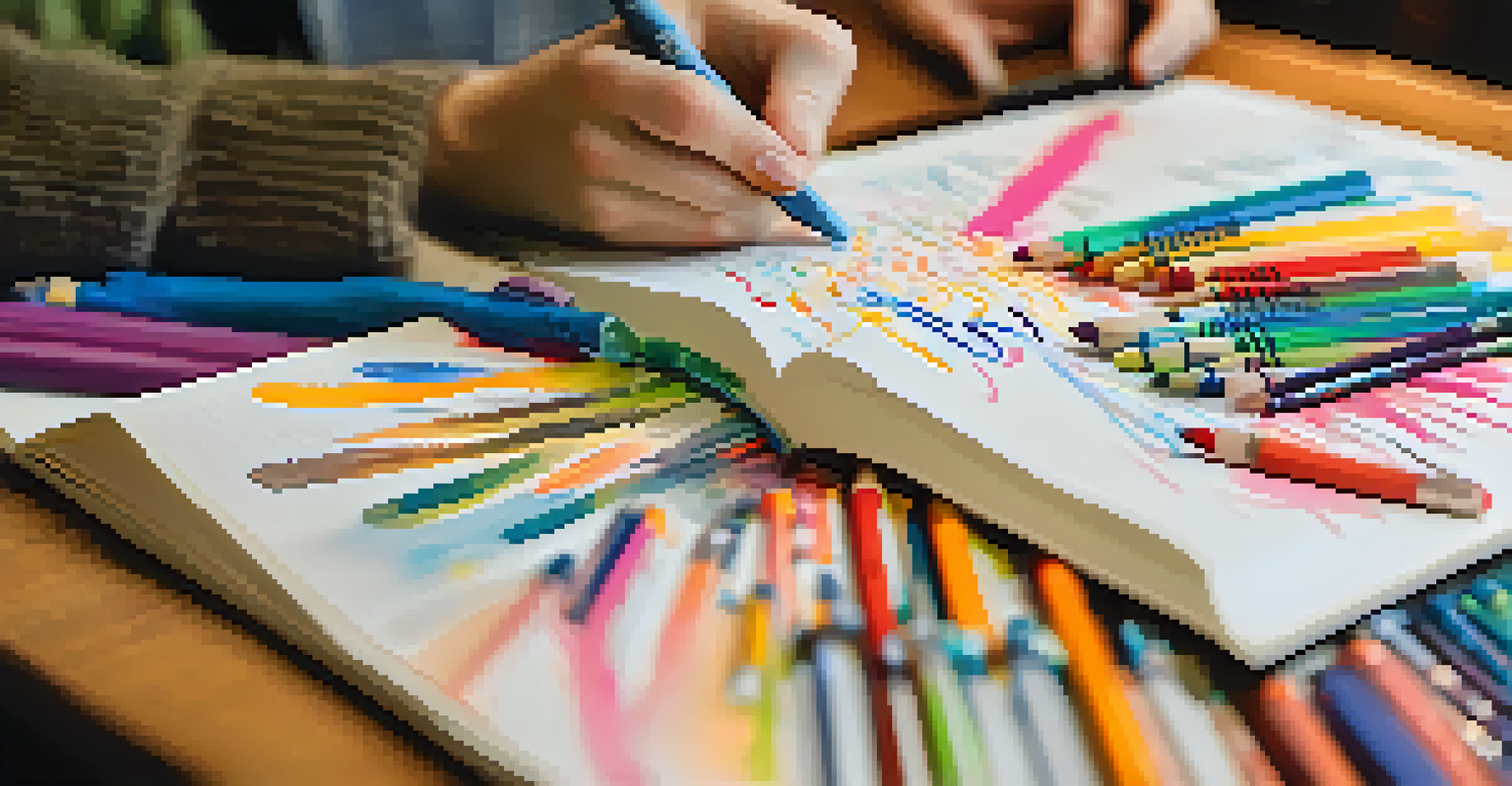Integrating Journaling in Hallucinogen-Assisted Healing

Understanding Hallucinogen-Assisted Healing
Hallucinogen-assisted healing involves using psychedelic substances under professional guidance to facilitate profound emotional and psychological healing. This approach often targets issues such as depression, PTSD, and anxiety. By altering one’s consciousness, individuals can gain insights into their trauma and experiences, paving the way for healing.
The wound is the place where the Light enters you.
The therapeutic benefits stem from the unique way these substances interact with the brain's chemistry and promote neuroplasticity, which is the brain's ability to reorganize itself. It’s like giving the mind a reset button, enabling new perspectives and emotional breakthroughs. However, the journey is complex and should always be approached with caution and care.
To maximize the healing potential of these experiences, integrating practices like journaling can be incredibly beneficial. This combination can help solidify insights gained during sessions and support ongoing emotional processing.
The Role of Journaling in Healing
Journaling acts as a powerful tool for reflection, allowing individuals to articulate their thoughts and feelings after hallucinogen-assisted sessions. Writing down experiences can clarify insights that may otherwise be fleeting, capturing those moments of revelation in a tangible form. This practice not only helps in understanding the experience but also in integrating lessons learned into daily life.

Moreover, journaling can serve as a safe space for processing difficult emotions that may arise during or after a session. By putting pen to paper, individuals can confront feelings that might feel overwhelming when left unexamined. It’s akin to having a conversation with oneself, offering a channel for emotional release and exploration.
Journaling Enhances Healing Insights
Incorporating journaling after hallucinogen-assisted sessions helps individuals articulate thoughts and integrate emotional insights into daily life.
In addition, maintaining a journal can help track progress over time. Individuals can look back and see how their perspectives have shifted, which can be incredibly affirming and motivating.
Creating a Safe Journaling Environment
Before diving into journaling, it’s important to create a safe and comfortable environment. This means finding a quiet space where individuals can write without distractions or interruptions. Having a cozy nook, perhaps with soft lighting or calming music, can set the stage for reflective writing.
What we fear doing most is usually what we most need to do.
Additionally, it’s helpful to establish a routine around journaling. Whether it’s right after a hallucinogen session or at a regular time each day, consistency can help make journaling a habit. Just like watering a plant, regular attention allows the process to flourish.
Finally, being gentle with oneself during this process is crucial. Journaling is not about perfection; it’s about expression. Allowing thoughts to flow freely, without self-judgment, encourages deeper exploration and understanding.
Guidance for Effective Journaling Practices
To make the most of journaling, consider prompts that encourage deep reflection. Questions like, 'What did I feel during my session?' or 'What insights did I gain?' can help guide the writing process. These prompts act as signposts, leading individuals deeper into their thoughts and emotions.
Another effective practice is to write without editing. Stream-of-consciousness writing can unlock hidden feelings and thoughts that might be stifled by the inner critic. This approach can be liberating, allowing individuals to express themselves authentically.
Safe Spaces Boost Reflective Writing
Creating a comfortable and distraction-free environment is essential for effective journaling and deeper emotional exploration.
Incorporating creative elements, such as drawing or poetry, can also enhance the journaling experience. This multi-faceted approach can tap into different parts of the brain, making the process not just therapeutic but also enjoyable.
The Importance of Integration Sessions
Integration sessions are meetings with a therapist or guide to discuss the experiences had during hallucinogen-assisted healing. These sessions are vital for processing insights and emotions that arise during psychedelic experiences. They provide a structured time to unpack feelings and thoughts in a supportive environment.
During integration, journaling can serve as a reference point for discussions. By bringing written reflections to these sessions, individuals can articulate their experiences more clearly. This not only aids in communication but also reinforces the importance of the insights gained.
Moreover, integration sessions provide context and support, helping individuals navigate the sometimes overwhelming emotions that can surface. Having a professional's guidance can bridge the gap between psychedelic experiences and everyday life.
Building a Community for Support
Connecting with a community of individuals who are also exploring hallucinogen-assisted healing can be incredibly valuable. Sharing experiences and insights can foster a sense of belonging and reduce feelings of isolation. Communities often provide a space for both accountability and support during the healing journey.
Journaling can play a role even within these community settings. Group members can share excerpts from their journals, offering different perspectives and insights that may resonate with others. It’s a wonderful way to learn from each other’s experiences and deepen the healing process.
Community Support Strengthens Growth
Connecting with a community of individuals exploring similar healing paths fosters belonging and enhances the journaling experience.
Additionally, community workshops or support groups can provide structured environments for discussion. They can serve as a platform for sharing journaling techniques, exploring themes, and celebrating progress together.
Conclusion: A Holistic Approach to Healing
Integrating journaling into hallucinogen-assisted healing offers a more holistic approach to personal growth and recovery. This practice not only enhances individual sessions but also supports ongoing emotional processing and integration of insights into daily life. It’s a way to weave together the threads of experience into a cohesive narrative.
As the journey unfolds, journaling can become a trusted companion, guiding individuals through the complexities of their emotions and thoughts. It’s about creating a pathway to understanding oneself better, especially in the wake of transformative experiences.

Ultimately, this blend of journaling and hallucinogen-assisted healing has the potential to lead to profound personal transformation, fostering resilience and a deeper connection to oneself.